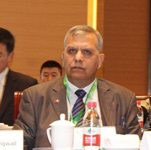Zamir Ahmed Awan: China-Pakistan Economic Corridor: Opportunities and challenges
November 27 , 2018A container is loaded on to the first Chinese container ship to depart after the inauguration of the China Pakistan Economic Corridor port in Gwadar, Pakistan, on Nov 13, 2016. [Photo/Agencies]
By Zamir Ahmed Awan, a senior fellow with Center for China and Globalization(CCG)
China-Pakistan Economic Corridor (CPEC), is under execution smoothly for the last couple of years and most of the early harvest projects have been completed or are at an advanced stage of completion. The fruits of CPEC projects will be enjoyed by Pakistan in the form of sufficient amount of electricity available almost to everyone, an improved network of roads in almost all parts of Pakistan, the growth of GDP and the country’s economic progress as compared to pre-CPEC time.
However, there are some challenges. I may categorize them in largely two groups; the internals and the externals. Just like any project, there might be some deficiencies in design, planning or execution; CPEC is also not absolutely free of such possible shortcomings. Pakistan does not have any experience of undertaking such mega projects. In the history of Pakistan the total foreign direct investment was only around $40 billion, while just under CPEC, it reached to more than $20 billion within only three years. Pakistan was not prepared for such a large investment and lacked the capacity to digest it. This was a major challenge for Pakistan.
Although China-Pakistan friendship is higher than mountains and deeper than Oceans, there is a lack of understanding Chinese systems, politics, culture, traditions, work ethics. To understand CPEC, it is absolutely important to understand China. There is dire need to understand Chinese culture, traditions, politics, system government, and business practices. It can be achieved by increased people-to-people contact and public diplomacy.
In the past, the China-Pakistan relations were focused in the diplomatic and political arena only. But under CPEC, the nature of this relation has turned into “business and economic”. This change may not have been realized by the Pakistani decision-makers yet. Business relations are profit driven and everybody wants to make it as much profit as possible.
I believe, China-Pakistan relations are just like one family, and all differences can be resolved within the family easily. There is no threat of any mishandling at all. I can see the roots of our friendship are so deep, that any minor issue may not be an irritant to move forward. We are all-weather, time-tested, all-dimensions friends and stood with each other at all difficult moments with each other. The future is bright and secure for both nations.
However, there are some external challenges, which are rather serious and need more cooperation between China and Pakistan. BRI is China’s mega initiative and recognized by around 100 countries and the international organizations. But some of the countries which are not happy with Chinese leading the globalization trend worldwide feel it a threat and try to sabotage CPEC through India and Afghanistan.
Pakistan is a smaller country and economically not strong enough and may not be able to protect CPEC alone. We need to join hands with China and formulate a joint policy to protect CPEC. Although China has always stood with Pakistan at all difficult times throughout the history of our relations of seven decades, at this moment, while CPEC is under challenge, we need to cooperate even closer and may take up a stronger and tougher stand.
We need to make this “flagship” project a success story and to show the rest of world CPEC as a “role model”. The success of CPEC will guarantee the success of all other five economic corridors planned under BRI. People of Pakistan and government of Pakistan are fully committed to making CPEC a success story, we are committed to overcoming any challenges, which might come across during its execution. We need support from our Chinese brothers and sisters to stand with us at this critical moment. We share a common destiny and work together in complete harmony.

Zamir Ahmed Awan is a senior fellow with Center for China and Globalization(CCG) and a sinologist at the National University of Sciences and Technology.
Topical News See more






